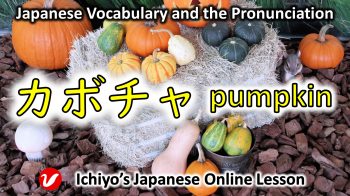The Japanese vocabulary「カボチャ (かぼちゃ、kabocha)」means “pumpkin.” Please learn the pronunciation and the example sentences.
Japanese Vocabulary and the Meaning
| Key Word | カボチャ |
| Hiragana | かぼちゃ |
| Romaji Reading | kabocha |
| English Meaning | pumpkin |
The Correct Japanese Pronunciations
Please learn the pronunciation by watching the attached video. You can also learn example sentences.
Our main YouTube channel: Ichiyo’s Japanese YouTube Channel
Our sub-YouTube channel (Japanese vocabulary videos): Ichiyo’s Subchannel
The Example Japanese Sentences
It is important to have skills in both non-honorific and honorific languages in order to use Japanese correctly.
Remove the pumpkin seeds cleanly.
Spoken and Non-honorific Language:
| Japanese Sentence | かぼちゃの種を綺麗に取り除いて。 |
| Romaji Reading | Kabocha no tane o kirei ni torinozoite. |
Please remove the pumpkin seeds cleanly.
Polite Form:
| Japanese Sentence | かぼちゃの種を綺麗に取り除いてください。 |
| Romaji Reading | Kabocha no tane o kirei ni torinozoite kudasai. |
I’ll boil the pumpkin sweetly.
Plain Form:
| Japanese Sentence | カボチャを甘く煮る。 |
| Romaji Reading | Kabocha o amaku niru. |
Polite Form:
| Japanese Sentence | カボチャを甘く煮ます。 |
| Romaji Reading | Kabocha o amaku nimasu. |
I’ll steam the pumpkin using a microwave.
Plain Form:
| Japanese Sentence | カボチャをレンジで蒸す。 |
| Romaji Reading | Kabocha o renji de musu. |
Polite Form:
| Japanese Sentence | カボチャをレンジで蒸します。 |
| Romaji Reading | Kabocha o renji de mushimasu. |

